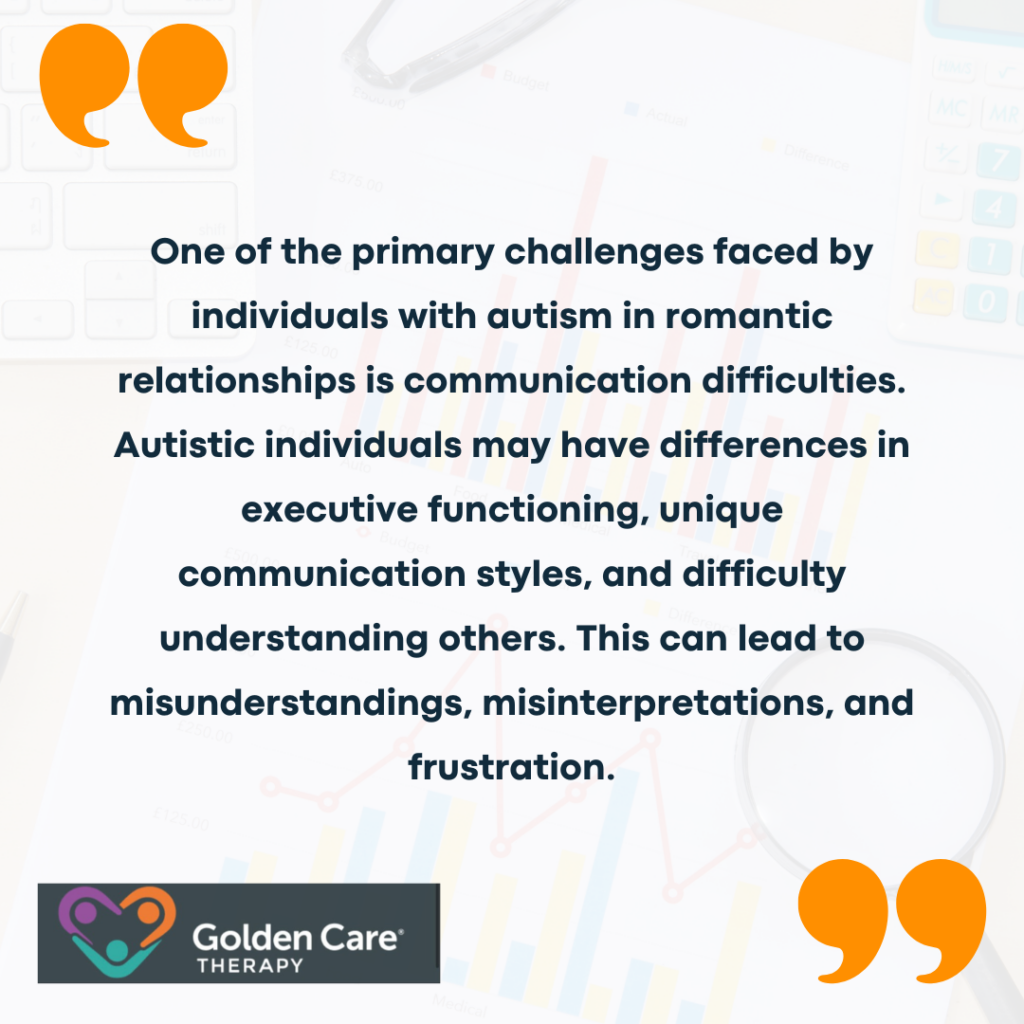Romantic relationships can be both exciting and challenging for anyone, but when one or both partners are on the autism spectrum, these relationships can look and feel a bit different.
Autism can influence how a person communicates, expresses emotions, and understands their partner’s needs. While these differences might create unique challenges, they can also bring strengths and opportunities for growth within the relationship.
Understanding how autism affects romantic relationships is an important step in building a strong, supportive connection.
How Does Autism Affect Romantic Relationships?
Autism can affect romantic relationships in various ways, often shaping communication, emotional expression, and social interaction. Many individuals with autism may struggle with interpreting social cues, such as body language or tone of voice, which are essential to maintaining a healthy relationship. This can sometimes lead to misunderstandings or feelings of frustration for both partners.
Additionally, challenges with emotional regulation and expressing feelings can make it difficult to connect on a deeper level, though individuals with autism are often deeply caring and committed in their relationships.
Their directness and honesty, while valuable, may sometimes be perceived as blunt or insensitive, requiring open communication and patience from both partners.
On the other hand, when both partners understand and adapt to each other’s needs, relationships involving someone on the autism spectrum can be fulfilling and enriching. Developing strategies for clear communication and respecting each other’s differences can help overcome obstacles.
Many couples find that focusing on shared interests, building trust, and having predictable routines strengthen their bond. With mutual understanding and effort, these relationships can thrive, offering both partners opportunities for growth, support, and connection.
Relationship Satisfaction
In terms of relationship satisfaction, studies have shown that individuals in relationships with other autistic individuals tend to report higher levels of satisfaction. This may be due to shared experiences, understanding, and mutual support.
However, it’s important to note that satisfaction levels can vary greatly depending on the individuals involved and their unique circumstances.
Autism can impact relationships in various ways, including communication difficulties, sensory issues, and differences in interpreting and expressing emotions. These challenges can sometimes lead to misunderstandings and conflicts.
However, with understanding, patience, and effective communication strategies, individuals on the autism spectrum can build and maintain satisfying romantic relationships.
Challenges in Romantic Relationships
Romantic relationships can bring both joy and challenges, and this holds true for individuals with autism as well. Autism can impact relationships through communication difficulties, shared interests, intimacy, and cohabitation.
While it may bring strengths like commitment, honesty, and strong passions, the challenges or strengths experienced will vary depending on how autism affects the individual.

Clear and effective communication is crucial for maintaining a strong connection in any relationship. For individuals with autism, it is important to establish open and honest communication with their partner.
Using clear and direct language, expressing thoughts and feelings explicitly, and actively listening to their partner’s perspective can help bridge the communication gap.
Intimacy can also present challenges in romantic relationships for individuals with autism. Discomfort with certain sensations due to sensory issues can lead to frustration and awkwardness in both sexual and non-sexual situations. Autistic individuals may struggle with sensory processing, finding certain sounds, textures, or movements overwhelming or uncomfortable.
It is essential for partners to have open and understanding conversations about sensory preferences and sensitivities. By creating a safe and supportive environment, couples can work together to navigate sensory challenges and find ways to ensure both partners feel comfortable and respected.
Understanding the unique challenges that autism can bring to romantic relationships is crucial for building understanding and empathy. Each individual’s experience with autism is unique, and it is important to approach relationships with patience, acceptance, and a willingness to learn and grow together.
Impact of Autism on Relationship Dynamics
Autism can have a significant impact on the dynamics between partners. Understanding these impacts is crucial for building and maintaining healthy relationships.
There are two key areas affected by autism in relationship dynamics which are emotional dysregulation and the misinterpretation of emotions. Let’s look at each of them in further detail.
Emotional Dysregulation
Emotional dysregulation, which is characterized by poorly regulated emotional responses, can pose challenges in romantic relationships for individuals with autism. This may manifest as impulsive behavior, frequent misunderstandings, and difficulties in recovering from disagreements, which can affect the overall dynamics of the relationship.
Anxiety, which is common among individuals with autism, can contribute to emotional dysregulation. Autistic individuals may experience high levels of stress and overanalyze situations, leading to excessive worrying about misunderstandings or feeling anxious.
This can result in difficulties in sleeping, irritability, and mood swings which can impact the emotional stability within the relationship.

Misinterpretation of Emotions
People with autism may find it challenging to express their emotions in socially expected ways, which can lead to misinterpretations of their feelings as apathetic. Due to difficulties in understanding social rules and cues, they may express their feelings inappropriately or struggle with recognizing and responding to the emotions of their partner.
Autistic individuals often have difficulty reading social cues. This can result in misinterpretations of moods and emotions, overlooking irritated facial expressions or tones of voice that may indicate underlying feelings.
Clear explanations and open communication are essential in helping individuals with autism understand what is appropriate in relationships, ensuring that their emotions are accurately perceived and understood by their partner.
Strategies for Maintaining Healthy Romantic Relationships
Maintaining a healthy and fulfilling romantic relationship when one partner has autism requires understanding, patience, and effective communication. Here are two key strategies that can contribute to the success of such relationships:
Open Communication
Open and honest communication is essential in any romantic relationship, and it holds particular importance when one partner has autism. Autistic individuals may approach relationships and social interactions in ways that neurotypical individuals may not completely understand, leading to myths and misconceptions.
Studies have shown that autistic adults experience higher levels of loneliness as opposed to their peers. By promoting open communication, both partners can gain a better understanding of each other’s perspectives, needs, and challenges.
In the context of autism, open communication involves expressing thoughts, feelings, and concerns in a clear and direct manner. It is crucial for both partners to openly discuss their expectations, boundaries, and any difficulties they may encounter in the relationship.

Understanding Individual Needs
Understanding and respecting each other’s individual needs is also vital in a romantic relationship involving autism. Autistic and non-autistic individuals value similar aspects of intimacy in relationships, such as emotional connection, trust, and communication.
However, differences in how each person perceives the world can present challenges in understanding each other, known as the “double empathy problem.”
To navigate these challenges, it is important for both partners to actively listen and empathize with each other’s perspectives. Autistic individuals may have special interests that they are passionate about, which might lead their partners to feel like those interests are prioritized over the relationship.
In the end, autism brings its own unique challenges and rewards to romantic relationships. Understanding, patience, and open communication can help couples navigate these differences and grow stronger together.
While the journey may require extra effort, it often leads to deeper connections and a love that embraces the beauty of being different. For those seeking support, Golden Care Therapy offers comprehensive ABA programs in NJ, Indiana, Georgia, and New York. Feel free to contact us today to learn more about how we can help.



